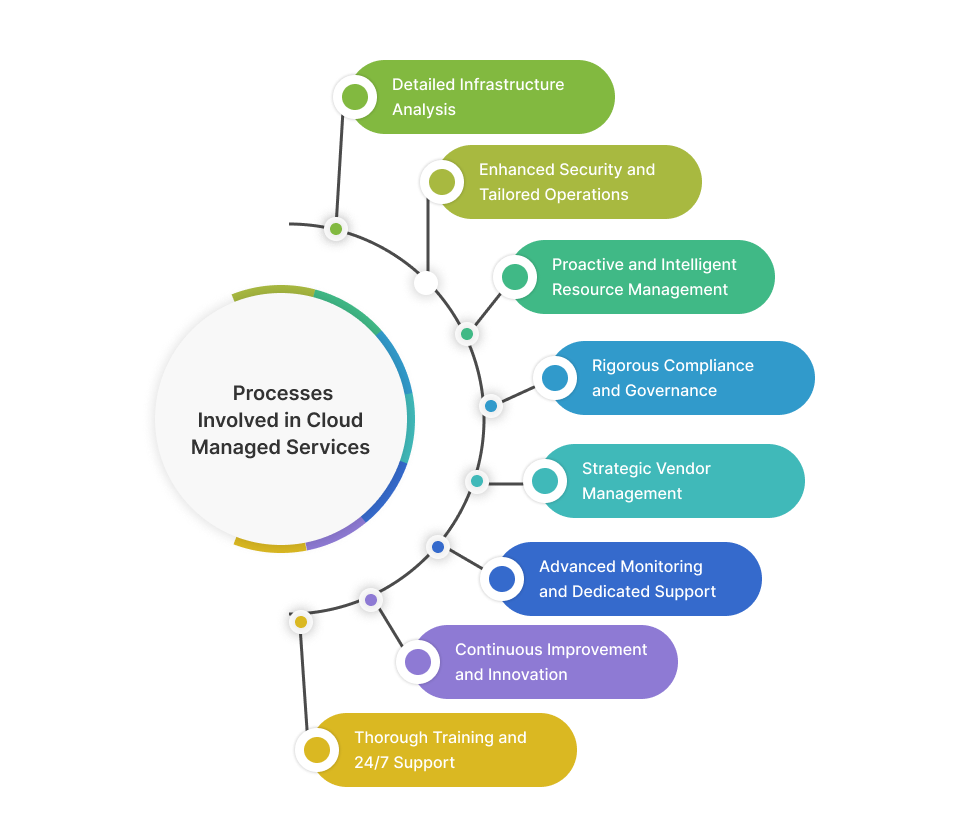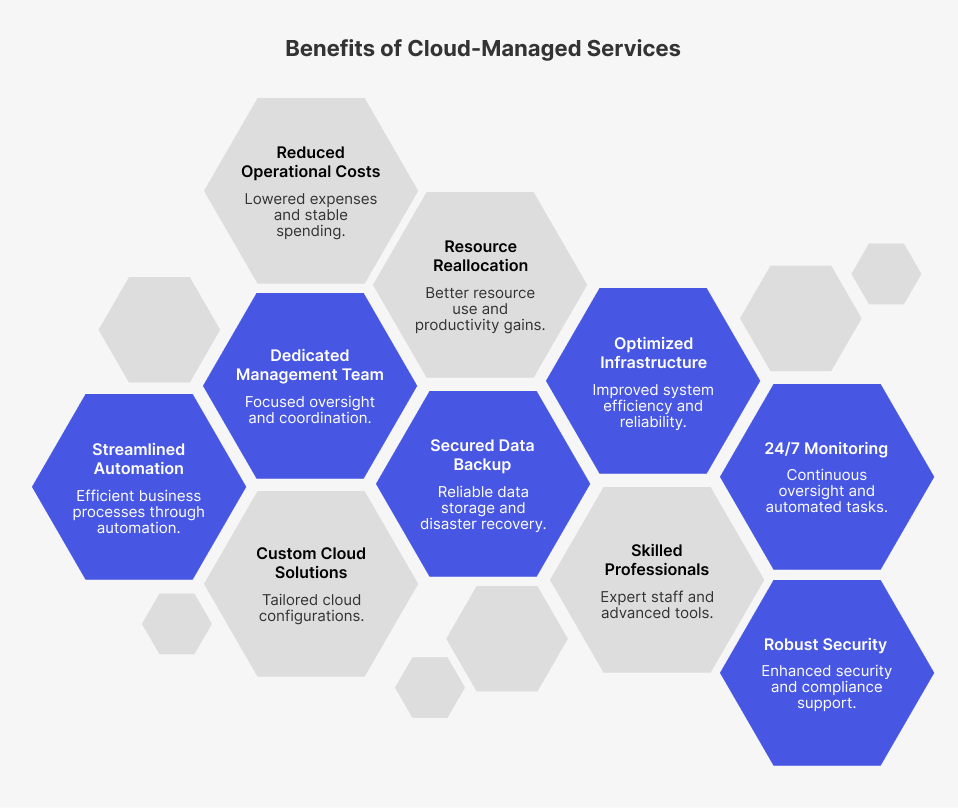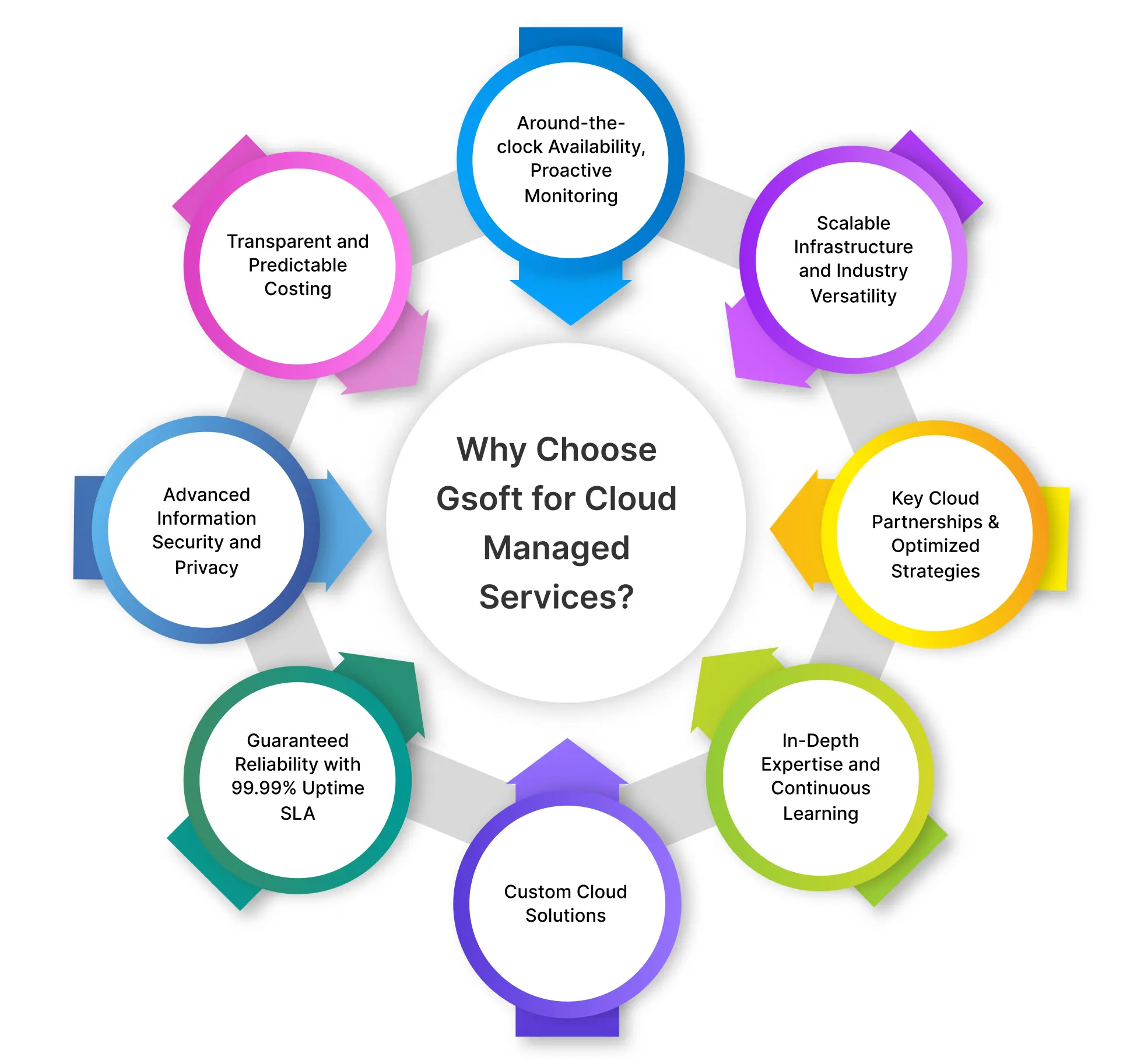Key Takeaways
- Before choosing managed cloud services, organizations must align the transition with their business goals and IT strategy, considering TCO and ROI to ensure financial benefits.
- Selecting a cloud-managed service provider requires evaluating their expertise, reliability, support, security, and compliance capabilities.
- Cloud-managed services can benefit businesses by offloading IT management, granting access to expertise, optimizing performance, and boosting security and compliance.
Traditional cloud systems often need substantial in-house expertise and resources to manage, making cloud computing complicated for many enterprises. This is where cloud-managed services come into play, providing a robust solution to these common challenges, such as In-house expertise and resource requirements, complexity in managing cloud computing, and ensuring security and compliance with industry standards.
Utilizing the expertise of a dedicated team, cloud-managed services ensure that your cloud infrastructure is not only optimized for performance but also secure and compliant with industry standards. This can help your business reap the benefits of cloud computing without the associated complexities, allowing you to focus on what you do best.
What are Cloud Managed Services?
Cloud-managed Services, also known as Managed Cloud, refer to the outsourcing of daily IT management and technical support for cloud-based services and solutions to automate and enhance your business operations. Perfect for businesses looking to lift the burden off their in-house IT teams, Managed services provide expert assistance and proactive monitoring to ensure a smooth, secure, and efficient cloud experience.
From network management, server management, and security to cloud application stacks and more, managed cloud services cover a wide spectrum tailored to meet the unique needs of each business. By opting for cloud-managed services, companies can ensure they are getting the cloud to its full potential, fostering innovation, and driving business growth.
What processes are involved in Cloud Managed Services?

- Detailed Infrastructure and Financial Analysis: Beyond a mere infrastructure setup, cloud-managed services conduct detailed infrastructure assessments, financial analyses, and strategic planning tailored specifically to align with your business objectives, ensuring a migration and management plan that's not one-size-fits-all but a perfect fit for your unique goals.
- Enhanced Security and Tailored Operations: Cloud-managed services go the extra mile, not just enabling data transfer and application migration but ensuring it's done with fortified security protocols. Data encryption and stringent access controls are meticulously managed, along with a customized cloud setup that reflects the specific needs of your business operations.
- Proactive and Intelligent Resource Management: Cloud-managed services dynamically scale resources but with a strategic approach to balancing performance and cost. Their expertise in fine-tuning the environment means your operations are not just reactive to demands but strategically prepared for efficiency and cost savings.
- Rigorous Compliance and Governance: Cloud-managed services bring vigilant compliance management, ensuring your cloud infrastructure is not just meeting but exceeding industry standards and regulations—a comprehensive approach to governance that regular cloud providers do not typically offer.
- Strategic Vendor Management: Cloud-managed services navigate the complexities of working with multiple cloud vendors, delivering a cohesive management experience. This includes negotiating contracts, managing relationships, and ensuring that vendor services are aligned with your business requirements for seamless functionality and service integration.
- Advanced Monitoring and Dedicated Support: With cloud-managed services, infrastructure monitoring is continuous, incident responses are rapid and targeted, and disaster recovery plans are robust and ready to deploy. This high level of attentiveness ensures minimal downtime and swift resolution of issues.
- Continuous Improvement and Innovation: Cloud-managed services actively use performance analytics to drive improvements and maintain your cloud services with the latest technological updates and industry best practices, ensuring your cloud infrastructure evolves as quickly as the technology does.
- Thorough Training and 24/7 Support: Cloud-managed services extend to empowering your team with thorough training and ongoing support, which stands in contrast to the limited assistance provided by standard cloud services. Your team benefits from expert knowledge, enhancing their efficiency and comfort with the cloud environment.
Key Use Cases for Managed Cloud Services
- Security Measures Designed to Protect Your Business’s Cloud Infrastructure: Include firewall management, intrusion detection, vulnerability assessment, and antivirus management. This can enhance your security posture, reduce the risk of data breaches, help you comply with industry standards, and give you access to security expertise.
- Management and Optimization of Your Network Infrastructure within the Cloud: Covers network monitoring, bandwidth management, and optimization of network operations. This will Improve your network performance, bring in cost efficiency, scalability, and reduced downtime.
- Cloud-Based Applications Management and Optimization: Cover application performance monitoring, patch management, and ensuring that your applications are always up to date and running efficiently.
What are the Different Types of Cloud Managed Services?
Cloud managed services include a wide range of services that help organizations effectively manage their cloud infrastructure. These services can be categorized into several types depending on your organization's needs and goals.
What are the Benefits of Cloud-Managed Services?

- Reduced Operational Costs and Predictable Spending: By outsourcing managed cloud services, companies can significantly reduce the need for in-house IT staff and related expenses. Most cloud-managed services operate on a subscription-based model, offering businesses predictable monthly or yearly costs.
- Robust Security Measures and Compliance Assistance: Managed service providers typically offer advanced security tools and expertise, helping to safeguard sensitive data. They also ensure that businesses adhere to industry standards and regulations, mitigating legal and financial risks.
- 24/7 Monitoring and Automated Management Tasks: Continuous monitoring of the cloud environment helps in identifying and resolving issues before they become critical. Routine tasks such as updates and patch management are automated, ensuring that systems are always up to date.
- Optimized Infrastructure and High Availability: Managed services ensure that cloud resources are optimally configured for performance. Measures are put in place to guarantee that services remain accessible, minimizing downtime.
- Skilled Professionals and State-of-the-Art Tools: Businesses gain access to a pool of experts with specialized skills and knowledge in cloud services. Managed service providers invest in the latest tools and technologies, ensuring enterprises benefit from these advancements.
- Secured Data Backup and Robust Disaster Recovery Plans: Regular backups ensure that data is protected and can be quickly restored in case of loss. Managed services help in developing and implementing effective disaster recovery strategies.
- Resource Reallocation and Increased Productivity: With the cloud infrastructure in expert hands, internal teams can focus on strategic initiatives and core business functions. Employees can concentrate on their primary responsibilities without being sidetracked by IT issues.
- Custom-designed Cloud Solutions: Tailored cloud services to meet unique business requirements, ensuring a seamless fit into existing operations.
- Streamlined Business operations through Automation: Automating critical business operations reduces manual effort, enhances accuracy, and improves operational efficiency.
- Dedicated Management Team: A dedicated team provides end-to-end management of cloud services, offering a single point of contact and personalized service delivery.
Discover how Gsoft’s Managed Services Helped Businesses Effectively Manage Cloud Resources!

Why and When Does an Organization Choose Cloud Managed Services?
Organizations often reach a point where the complexity of maintaining their cloud infrastructure, coupled with the challenges of implementing DevOps practices—such as continuous integration and deployment—outstrips their internal capabilities. In such scenarios, businesses can gain a clearer understanding of whether cloud-managed services align with their needs and priorities by asking themselves relevant questions, helping their decision-making process.
To assist in your decision-making process, consider the following scenarios as examples of when cloud-managed services might be the optimal solution for your organization.
-
Is Your Business Facing Data Management Difficulties?
While a standard cloud service provider may supply the infrastructure for data storage, cloud-managed services go several steps further. They provide comprehensive data management solutions tailored to your business needs. This isn't just about storing your data; it's about securing it against breaches, managing accessibility for efficiency, and ensuring it is backed up with failproof recovery solutions
-
Are IT Costs Becoming Unpredictable and Hard to Manage?
Cloud-managed services provide a cost-effective solution with predictable pricing models. By outsourcing your cloud management, you can reduce the need for in-house IT staff and cut down on operational costs.
-
Is Your IT Team Overwhelmed with Routine Maintenance Tasks?
Outsourcing to a cloud-managed service provider frees up your IT team, allowing them to focus on strategic initiatives that add value to your business, rather than dealing significantly and frequently with routine maintenance and updates.
-
Does Your Business Require High Levels of Data Security and Compliance?
Managed service providers specialize in security and compliance, ensuring that your cloud environment adheres to industry standards and is protected against threats. This is crucial for businesses handling sensitive data or operating in heavily regulated industries.
-
Are You Struggling with System Downtime and Availability Issues?
Cloud-managed services offer 24/7 monitoring and management of your cloud environment, ensuring high availability and minimizing downtime. This is vital for maintaining productivity and ensuring a seamless experience for your customers.
-
Are You Looking to Facilitate Streamlined and Efficient Scaling for Your Business?
In contrast to the standard scale-as-you-go model offered by typical cloud service providers, cloud-managed services deliver a strategic edge in scalability. These services understand that rapid scaling isn't just about increasing resources; it's about aligning those resources precisely with your growth trajectory. They proactively manage your scaling needs, allowing for swift expansion or contraction of resources in response to your business's real-time demands. This eliminates the lag time and over-provisioning common with traditional cloud services, ensuring you don't just grow, but you grow smartly, with the right resources at the right time, minus the hefty initial investments.
-
Do You Lack In-House Expertise in Cloud Services?
Managed service providers bring a wealth of knowledge and expertise in cloud services, providing you access to skilled professionals and advanced tools that might be lacking in your own team.
-
Is Ensuring Business Continuity a Priority for Your Organization?
With robust data backup and disaster recovery solutions, cloud managed services play a critical role in ensuring business continuity, even in the face of unexpected events or data loss.
-
At what stage do businesses typically encounter difficulties managing cloud infrastructure and implementing DevOps practices?
Organizations commonly hit a bottleneck when the complexity of maintaining their cloud infrastructure scales, and the challenges of adopting DevOps practices—like continuous integration and deployment—exceed their in-house expertise and capabilities. This often occurs during periods of rapid growth or when technology adoption outpaces the current team's skill set, necessitating a more robust approach or external support to streamline these critical processes.
Cloud Services vs. Cloud Managed Services: A Comparison
A lot of people are getting confused between cloud services and managed cloud services, and which is best suited to their business needs. Explore the key differences and unique features of Cloud Services and Cloud Managed Services in this concise comparison table.
What is a Managed Cloud Service Provider (MCSP)?
A Managed Cloud Service Provider (MCSP) is a third-party company that offers end-to-end services to help businesses manage their cloud-based resources, applications, and infrastructure. MCSPs provide the expertise, tools, and support needed to ensure optimal performance, security, and efficiency of cloud services. They help businesses with dedicated resources, custom business solutions, and a specialized implementation team, all to ensure businesses achieve optimal performance, fortified security, and enhanced efficiency in their cloud operations.
For example, Amazon Web Services (AWS) Managed Services provides complete management of AWS infrastructure, ensuring security, compliance, and operational best practices. Similarly, Microsoft Azure Managed Services offers a range of services to manage applications, infrastructure, and environments hosted on Azure.
What is Cloud Infrastructure Managed Services?
The outsourcing of management responsibilities and functions for a company's cloud computing infrastructure is Cloud Infrastructure Managed Services. This includes managing computing power, storage, network operations, and other cloud components. These service providers take the responsibility of ensuring the cloud infrastructure is running efficiently and securely and is consistently optimized to meet the business's needs.
Cloud Infrastructure Managed Services vs. Managed Cloud Services
Why Choose Gsoft for Cloud Managed Services?

Choosing Gsoft as your managed cloud service provider for cloud managed services brings unparalleled expertise and tailored solutions to your business's doorstep.
- Around-the-clock availability, Proactive Monitoring, and Problem-Solving: With Gsoft, support isn’t limited to business hours. We provide 24/7 assistance, ensuring that help is available whenever you need it, mitigating risks, and minimizing downtime. Our team doesn’t just respond to issues; they proactively monitor your cloud environment to identify and resolve potential problems before they can impact your operations.
- Scalable Infrastructure and Industry Versatility: Whether you’re a startup or an established enterprise, Gsoft has the scalability to tailor their services to your specific needs, ensuring that you have the right resources at every stage of your growth.
- Key Cloud Partnerships, Exclusive Access to Tools and Features, and Optimized Cloud Strategies: Gsoft’s strong partnerships with major cloud providers like AWS, Azure, and GCP mean that you get access to the latest tools, features, and best practices. These partnerships enable Gsoft to design optimized cloud strategies, ensuring that you’re utilizing the full potential of your cloud environment.
- In-Depth Expertise and Continuous Learning: The Gsoft team consists of certified professionals for AWS, Azure, and GCP, guaranteeing that you’re working with experts who have a deep understanding of these platforms. Gsoft invests in ongoing training and certification programs for their team, ensuring that their knowledge is always up to date with the latest advancements in cloud technology.
- Custom Solutions: Gsoft ensures that your cloud environment is perfectly aligned with your business goals and operational needs.
- Guaranteed Reliability with 99.99% Uptime SLA: Our service level agreement promises a 99.99% uptime, ensuring your business operations are consistently running with minimal interruption, thus maintaining productivity and customer satisfaction.
- Advanced Information Security and Privacy: At Gsoft, we prioritize your data's security and privacy with state-of-the-art encryption and stringent protocols, providing a fortified environment against digital threats and ensuring compliance with privacy regulations.
- Transparent and Predictable Costing: With Gsoft, financial surprises are off the table. Our predictable cost model means you can budget with confidence, knowing your cloud services expenses will align with the outlined projections, allowing for better financial planning and resource allocation.
Key Services Provided by Gsoft as a Managed Cloud Service Provider include:
- Cloud Consulting: Cloud Migration Services, Cloud Strategy and Planning Services, Cloud Architecture and Design Services, Cloud Security Services, Cloud DevOps Services, Cloud Cost Optimization Services, Cloud Data Management Services, and Cloud Support and Maintenance Services.
- Managed Services: Cloud Strategy and Planning, Cloud Architecture Design, Infrastructure Management, Application Management Services, Automation and DevOps, Cloud Migration, Security and Compliance, Disaster Recovery, and Support and Maintenance.
- Security & Compliance: Build Security, Infrastructure Security, and Workload Security.
- Cloud-Native Development: Cloud-Native Application Development, Legacy Modernization, Micro-service Architecture Development, and DevOps Implementation.
- Cloud Migration: Application Migration, Data Migration, and Infrastructure Migration.
- Cloud Cost Optimization: Analyzing and reducing cloud spending, implementing cost-saving practices, and utilizing tools for budget management and forecasting.
- DevOps Automation: Automating CI/CD processes, infrastructure as code services, and minimizing manual intervention for efficiency.
- Hybrid & Multi-Cloud Solutions: Managing multiple cloud environments (multi-cloud), integrating on-premises infrastructure with cloud services (hybrid cloud), and focusing on scalability, security, and operation across different cloud platforms.
FAQs of Cloud Managed Services
Q:
Is cloud managed service the same as a managed IT service?
No, while there is overlap between cloud-managed services and managed IT services, they are not the same. Cloud-managed services are a subset of managed IT services, with a specific focus on managing and optimizing cloud-based resources.
Q:
What is Managed Cloud Infrastructure?
The practice of outsourcing the management, monitoring, and optimization of cloud-based resources and services to a third-party provider is Managed Cloud Infrastructure. It allows organizations to get the full potential of the cloud, while ensuring that their cloud environment is secure, efficient, and well-maintained. It provides access to expertise and resources that may not be available in-house and allows organizations to focus on their core business activities.
Q:
Are cloud managed services secure?
Yes, cloud managed services can be highly secure when implemented with robust security practices and protocols. but like any other IT service, the level of security depends on the practices and protocols implemented by the managed service provider (MSP) and the enterprise. Organizations need to be proactive in understanding and ensuring that their MSP adheres to high security standards, and they must also play their part in maintaining security through proper configuration, employee training, and adherence to security best practices.
Q:
How do cloud managed services handle disaster recovery and data backups?
Cloud managed services play a critical role in ensuring that organizations are prepared for disasters and can recover quickly with minimal data loss. They handle disaster recovery and data backups by implementing comprehensive strategies, utilizing cloud infrastructure for replication and secure storage, conducting regular tests, and monitoring for potential issues. By doing so, they help organizations maintain business continuity and protect their valuable data.
Q:
Do I lose control over my cloud infrastructure when using a managed service?
No, when you use a managed service for your cloud infrastructure, you delegate some level of control to the service provider, but this doesn't necessarily mean you lose all control. The degree of control you retain can depend on the specific arrangements made with the managed service provider (MSP) and the services they are providing.
Q:
What is the role of automation in cloud managed services?
Automation plays a crucial role in cloud managed services, enhancing efficiency, reducing human error, and enabling faster response times. By automating repetitive and time-consuming tasks, managed service providers (MSPs) can focus more on strategic initiatives and improve overall service quality. Some of the important role of automation in cloud managed services includes automated deployment, security scans and backups.
Q:
Can I customize the services provided by a cloud managed service provider?
Yes, you can customize the services provided by a cloud managed service provider (MSP) to suit the specific needs and requirements of your organization. Customization is one of the key benefits of working with MSPs, as it allows businesses to tailor the services they receive to align with their operational objectives, industry standards, and regulatory requirements.
For example, you can tailor security protocols and compliance measures to meet industry standards and regulatory requirements specific to your business, or customize how cloud resources are allocated, scaled, and optimized to suit your workload demands and cost management goals or, define what types of reports and analytics you require, including performance metrics, cost analysis, and security audits.
Q:
Can I switch cloud managed service providers if I'm not satisfied?
Yes, you can switch cloud managed service providers if you are not satisfied with their services. However, the process can be complex and requires careful planning to ensure a smooth transition and continuity of services. Ensuring clear communication, proper documentation, and compliance with contractual obligations are key to a successful transition. With the right approach, you can switch providers with minimal disruption to your operations and establish a more satisfactory partnership with your new managed service provider.



